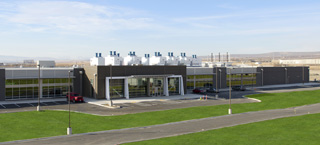|
Subscribe / Renew |
|
|
Contact Us |
|
| ► Subscribe to our Free Weekly Newsletter | |
| home | Welcome, sign in or click here to subscribe. | login |
Real Estate
| |
 |
December 13, 2012
Businesses rethink data storage on ‘the cloud’
Sabey Data Centers

Ford
|
At a recent conference in France, I met a woman who was working for a new technology company. Since I work for a data center company, I asked where her company was storing its servers.
“We don’t have any servers,” she told me. “All our data is stored on the cloud.”
“But you must have servers somewhere,” I said. “Even if you’re using cloud services, your data still has to be stored on a server or storage device someplace.”
“Oh, no. It’s all on the cloud.”
If you’re a business person, chances are you’ve heard about “keeping data on the cloud.” But you may not understand what is meant by “the cloud,” or how using cloud services can benefit your business.
What is the cloud?
One common question I hear from business people is, “If I put computer files on the cloud, where does my data really go?”
The answer is simple: When you put data on the cloud you’re saving files on a public computer server, just as if you were saving those files on a private server at your own business. The only differences are the server is off-site and you share the server with other companies.
Think of a public cloud as being like your local bank. You deposit money at your bank, but so do a lot of other people. You are the only person with access to your bank account, which contains only the amount of money you’ve deposited in it.
A cloud environment works the same way. The cloud is the “bank,” a virtual database on a public server where you store computer files. The server itself is the “bank vault” where you store information. Other companies may share the same server, but only you have access to your data on the cloud.
A cloud services provider is the “bank organization” that owns and provides the servers for your use. You usually pay a set fee to access the public cloud servers, based on the amount of storage space you use (i.e. $1 per gigabyte). Some companies use only a few gigabytes of storage capacity, while others may use 1 terabyte or more.
Public vs. private clouds
A public cloud is where you pay for computer space on a public server (or group of servers) owned by a cloud services provider. But you can also set up a private cloud — a group of off-site servers owned entirely by your business. You buy these servers yourself, and house them in a data center.
A private cloud gives you more control over your infrastructure and the data on your servers. For example, if you have multiple business locations throughout the U.S., you can connect them all to the same private cloud servers. Your business locations share server space, and you control access to the servers through firewalls.
You can also have a hybrid cloud — a mix of public and private cloud servers. For example, if you have an e-commerce site, you can host it on a public cloud server, to give the public easy access to it. Meanwhile, you use your privately owned cloud servers for product development.
How do data centers fit in?
Data centers are large critical environment facilities where companies lease space to store their servers. Our company, Sabey Data Centers, provides space in data centers across the U.S. for companies to keep their servers. We also provide redundant power and cooling to keep the servers running cost effectively via economies of scale; network access so the servers can link to outside networks; and high-level security to keep the servers safe.
Data centers are the ideal setting for a cloud environment. Sabey Data Centers provides hosting of public servers for numerous cloud service companies. We also host private cloud servers that are owned by specific companies.
Why use the cloud?
Today, businesses have a number of reasons for using cloud services:
• Reduced IT costs. When you store data on a cloud, you don’t have to buy your own servers, pay for power and cooling to run them, or pay maintenance costs. The cloud provider buys its own servers and makes them available to you. The provider pays for power, cooling and maintenance at the data center where it stores its infrastructure.
• Scalability. The cloud model makes it easy to scale up your IT infrastructure to keep pace with business growth. Cloud providers have the server capacity ready for you. You simply ask for an increase in memory (i.e. from 500 gigabytes up to 1 terabyte). It’s easier and cheaper than buying a new server each time you max out your current capacity.
You can also do “burstable” memory increases. For example, if traffic on your e-commerce site peaks during the holiday season, a cloud provider can give you a temporary bandwidth increase until Jan. 5. You don’t need to buy an extra server just for the holiday rush.
• Customer requirements. Some customers may require you to put data or applications on a public cloud, so they can access it from their own business locations. Also, the cloud is becoming a platform for certain verticals (i.e. financial and health-care companies) to make information available for regulatory compliance.
How do you use the cloud?
There are many cost-effective cloud-based services that can benefit your business:
• Infrastructure as a service (IaaS). Instead of buying your own servers, you rent space on a cloud server. You can use that space to store files and important data off-site, host customer service applications, create a collaborative environment for your employees to use, etc.
• Software as a service (SaaS). You pay a subscription to access and use a software package (i.e. accounting software) that is stored on the cloud by a software provider. You don’t have to buy the software, and all your employees can use it whenever they need it.
• Platform as a service (PaaS). A platform services provider offers a development platform that is on a cloud server. You pay a subscription to access and use this platform to develop your own applications.
Concerns over the cloud
As with any new technology, many business owners have concerns over cloud technologies:
• Security. While your data is still relatively safe on the cloud, many providers only have limited security standards to address data privacy and encryption issues.
• Standardization. The lack of standardized protocols makes it hard for customers to compare cloud services between different providers, and sometimes makes it difficult to transfer data from one provider’s cloud to another’s.
• Limited SLAs. Often, cloud providers take a one-size-fits-all approach with service level agreements, offering basic service terms with limited accountability.
Different cloud providers offer different levels of service, and some cloud providers may be better equipped than others to handle your specific business needs. But better solutions to these concerns will be developed over the next 10 years, as cloud technology and services continue to be improved.
What most people don’t recognize is that all cloud providers reside in a data center and that the cloud providers’ ability to maintain uptime is only as good as the infrastructure behind it. That’s why Sabey Data Centers builds resilient data centers in multiple locations.
John Ford, vice president of Sabey Data Centers, is a 20-year veteran of the IT and telecommunications industries.
Other Stories:
- New economy demands new fundamentals, vision
- Look beyond the words of restrictive covenants
- Bellingham embarking on waterfront redevelopment
- Real Estate Surveys: Capitol Hill Housing
- Real Estate Surveys: Real Estate Investment Services
- Real Estate Surveys: Spectrum Development Solutions
- Real Estate Surveys: Kinzer Real Estate Services
- Real Estate Surveys: Clise Properties
- Real Estate Surveys: Talon Private Capital
- Tacoma lays down a new path for growth
- South Lake Union office is a smart growth model
- CBA Insights speakers profile: Lisa Picard
- CBA Insights speakers profile: Caroline King
- Tech companies boost local office market
- Multifamily: A buyer’s or seller’s market?
- It’s a great time to invest in local retail
- Cautious optimism for industrial market
- Are you maximizing your real estate tax benefits?
- Real Estate Surveys: O&S Partners
- Real Estate Surveys: Trammell Crow Co.
- CBA Insights speakers profile: Matt Hooper



